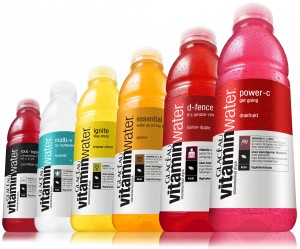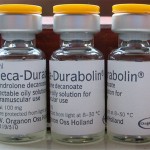By Anthoney J. Andersen – Steroidal.com
When it comes to properly hydrating our bodies, most people would have to agree that -even though it’s a vital component to overall health – water isn’t always the most thirst quenching liquid to turn to.
Water is sometimes a substance that most of us take for granted. But who can blame you? We live in a world with a wide variety of flavored sports drinks that seem more appealing to curb your dehydration than a ‘flavorless’ fluid, like water.
But how healthy are these drinks that have come to replace water during exercise?
One drink in particular that has grown increasingly popular over the years is vitamin water.
THE VALUE OF H2O
The human body can last weeks without food, but it can last only days without water. According to Betterhealth.gov, the body is made up of 50 to 75 percent water, which forms the basis of blood, digestive juices, urine and perspiration and is contained in lean muscle, fat and bones.
Water is also responsible for a wide variety of essential functions in the human body. Drinking water allows for the regulation of your body’s temperature, while helping flush out toxins and other harmful bacteria (like viruses) from your body.
According to WebMD, water is an essential nutrient that provides five vital functions in our body:
- Cell life – distributes nutrients and helps maintain the health and integrity of every cell in the body.
- Chemical and metabolic reactions – removes waste products including toxins that the organs’ cells reject, and flushes them out of the body through urine and feces.
- Transport of nutrients – carries nutrients and oxygen to the cells, while keeping the bloodstream liquid enough to flow through blood vessels.
- Body temperature regulation – helps regulate the body’s temperature through sweating. However, the more you sweat, the more water your body loses, so restoring its supply is vital.
- Elimination of waste – helps eliminate the byproducts of the body’s metabolism, excess electrolytes (for example, sodium and potassium), and urea, which is a waste product created through the processing of dietary protein.
THE PROPOSAL
According to the U.S. Food and Drug Administration (FDA), bottled water (including vitamin water) is the second highest purchased type of drink in the United States, just behind carbonated sodas. With nearly 35 percent of the U.S. adult population classified as obese (two-thirds are considered overweight), many Americans seem to be flocking toward a more enriched/healthier lifestyle.
By doing so, Americans have increased their interests in dietary supplements, which includes ‘health drinks’ such as vitamin water. However, just because the word ‘vitamin’ is stamped to the drink label, doesn’t necessarily mean it is healthy. In fact, the health benefits of vitamin water don’t even begin to compare to the benefits of plain water.
In some cases, vitamin water can severely hinder your diet and delay your weight loss goals.
And here’s why.
THE INGREDIENTS
According to Fitday.com, vitamin water is merely sugar that has been combined with ‘man-made’ vitamins. Nutritionists and researchers have not proven synthetic vitamins to be as healthy as naturally occurring vitamins and minerals found in food.
“You have vitamins and minerals that occur naturally in foods, and then you have people taking supplements, and then you have all these fortified foods,” said Mridul Datta, an assistant professor in the department of nutrition science at Purdue University. “It adds up to quite an excess. There’s the potential for people to get a lot more of these vitamins than they need.”
When you stop and take a closer look at the components that make of vitamin water, what you’ll come to find out is that these health beverages are simply made up of syrups, sweeteners and other flavors that mirror the taste of some fruits, according to Livestrong.com.
Some vitamin water even contains caffeine, so it’s essential for parents to read the labels before even giving them to children. The FDA requires that all bottled water manufacturers list all product ingredients on the bottle.
Another growing concern with vitamin-fortified water is the serving size per container. Some bottles contain more than one serving (sometimes two or three servings) and we find ourselves drinking the entire bottle of these ‘fruity’ beverages.
If you’re trying to lose weight by watching your caloric intake, then consuming excess calories from liquids will surely find your diet goals pedaling backwards.
According to Mayo Clinic, liquids can contribute to nearly 25 percent of daily calories in the American diet.
“It’s very hard to figure out the logic the manufacturers are using to do this fortification,” said Valerie Tarasuk, a nutrition science professor in the faculty of medicine at the University of Toronto. “The most common nutrients that are added to these drinks, are already plentiful in the average person’s diet, so their widespread inclusion in these drinks is almost completely unnecessary.”
COST EFFICIENCY
Drinking plain tap water might not be fulfilling in taste, but it’s healthier for your body and more economically viable on your wallet. Tap water is not only free, but the Environmental Protection Agency (EPA) tests it regularly for contaminants to protect the well being of the public.
According to Fitday.com, the average bottle of vitamin water can cost an upwards of $3.50, which over time, can put a large dent in your piggy bank.
CONCLUSION
Even though tap water seems unappetizing to some, it might be in your best interest the next time you exercise to fill your water bottle full of the flavorless beverage, before reaching for that colorful – sugary alternative – that may wind up being detrimental to both your health and your wallet.
Choose wisely.








